Best free online dictionaries for translators and linguists
Sorry traditionalists, but printed dictionaries are on the way out!
They are either too small to contain enough entries or too large for those of us who travel, as well as being too expensive.
In the time it takes me to go get a big fat dictionary, and flick through the pages for a particular entry (which may not even be there), I could have looked up several words on several sites, and even read a bit of the Wikipedia article for the term, all through free online sites that are just as good or usually much better than their printed equivalents.
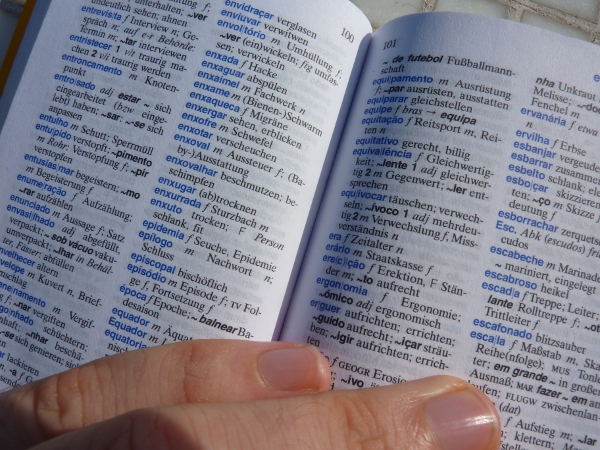
As a technical translator for technology-based documents, the concepts of most documents I translate didn't even exist ten years ago, so a printed dictionary may already be out of date if I were to buy it for the ridiculously high prices that most of the best large dictionaries sell for nowadays…
So today I'm going to share several of my favourite free online dictionaries with you! Note that most of these are actually technical dictionaries (apart from Wordreference), so they may not be so useful for looking up basic words and would thus not suit beginner to intermediate learners. For legal, economic, medical, litherary, political, technological, financial, scientific, industrial etc. words, sometimes you need a more efficient solution than a general dictionary for finding the right translation.
If it's a basic word, don't forget my advice about using Google Image to see what it means without even needing a translation (presuming it's not an abstract quality)! I've also discussed the use of online forums and special Google searches to clear any language doubts you may be having. However, if you need a good translation of a word in the right context and you don't know it already, these are an excellent place to start!
Multilingual dictionaries
Most of these sites do not actually specialise in one language. Since they are mostly not even written by one company, but are open to the community for editing, they can be used for several languages. Don't think of this as them “spreading themselves thin”, some of these have vast amounts of words in particular language combinations that would put several specialised large printed dictionaries to shame! Of course, you should always be a bit sceptical before committing to a translation, and try to confirm your translation on several dictionaries or online forums.
Wikipedia
Wikipedia is already well known as the free online encyclopedia, but did you know that it is also an essential tool for many translators? If you look up an entry on Wikipedia (and some on Wiktionary), it is very likely that the page has a frame on the left indicating several translations for that entry in other languages. You can read those entries in the other language if you wish, but sometimes the title of the entry is all you need; especially once you have confirmed that the entry you originally came to is in the right context (e.g. there are two main ways of looking at the English word “nail”; what is at the end of your fingers, and what you hit with a hammer, each with very different translations).
Of course, you need to go to the particular Wikipedia for the source language of the term you are looking up, rather than necessarily the English version. Wikipedia has over 100,000 individual entries in each of the 28 top languages, which can make it a very useful dictionary indeed! Overall, it is available in over 200 languages, and you can see the list of them here.
Wordreference
Wordreference is my favourite dictionary for looking up simple words, concepts, expressions, and some grammatical doubts. I especially like its automatic suggestion as you type and its ability to conjugate (regular and irregular) verbs in a search (e.g. searching for quepa in Spanish will direct you to the verb caber, “to fit”, as well as tell you what conjugation quepa is of this verb and give a link to its full conjugation table). If the base dictionary doesn't have the term you are looking for, unless it's really obscure, it's likely that someone else will have asked about it in the forums and there will be a link to that discussion for you to read. You can of course ask the question yourself if you sign up for a free account.
One advantage of this over some other simple dictionaries is that it usually has several entries on a single word if it can be translated in other ways, and would usually give at least a one word synonym as well as possibly an example sentence to suggest context. It can help for some technical terminology, but I usually avoid this dictionary if the word is technical. This dictionary is very good for Spanish, French and Italian (to/from English) since these options have been on the site for several years. It is less extensive, but is constantly improving for German, Russian, Portuguese, Polish, Romanian, Czech, Greek, Turkish, Chinese, Japanese, Korean, and Arabic.
Proz
The Proz term search results (using the Kudoz option) are provided entirely by translators who have spent time working on researching that particular term. It is excellent for more technical words, and all terminology is given in categories, and the term itself is almost always given in the sentence and context that is relevant to it. This is important for confidence, since one-word translations of words for all situations are actually not that common as I suggested above in the Wikipedia example. It has a huge amount of language options and you can ask a question yourself if you don't find a satisfactory answer in the search.
Because nearly all of these solutions are given by professional translators, this dictionary is not useful for basic terminology that fluent speakers are presumed to know already. If your term contains several words, use quotation marks ” ” for that exact phrase, or plus signs + to include each word in no particular order. Just searching for all the words directly will give an “OR” result, which is not useful for set phrases.
IATE
The InterActive Terminology for Europe is a vast database of terminology applied in official public EU documents, covering many fields and all official EU languages. Depending on the word you wish to translate, this may be the most appropriate source. Example translations are given and you can search by category. This is quite technical, and not the best for more natural language.
MyMemory
I have recently discovered MyMemory from translated.net, and I am quite impressed! It opens up Translation Memories from professional translators and makes them searchable. Like other sites mentioned here, it has many language combinations, and category relevant search options and is constantly updated.
Bilingual dictionaries
It's harder to be general here, because there are so many languages to cover, and there may be very good dictionaries for any given language (to/from English). Ones that I have come across so far include Grand dictionnaire termilogique, Quebec's officially promoted dictionary, which has saved me on occasion for French translations much more than some of those above. Once again, this is a dictionary for technical terminology.
For German you can use Leo, for Irish there's focal.ie, Slovnik for Czech and many, many more!
If you found this post interesting, please share it with your friends on Facebook, twitter, Stumbleupon or however else you like! 😀


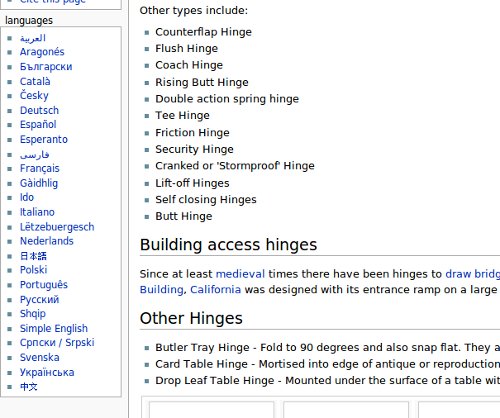
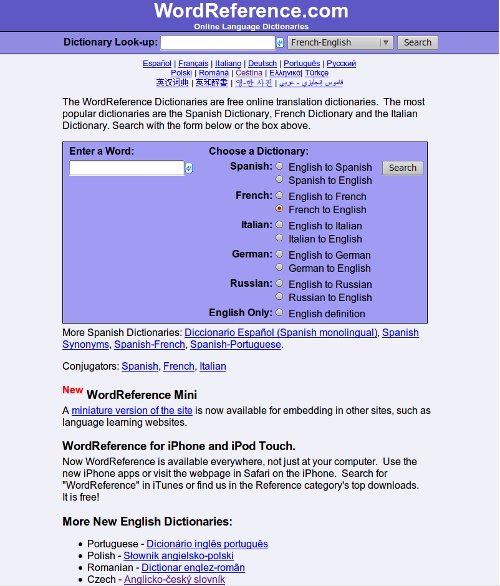
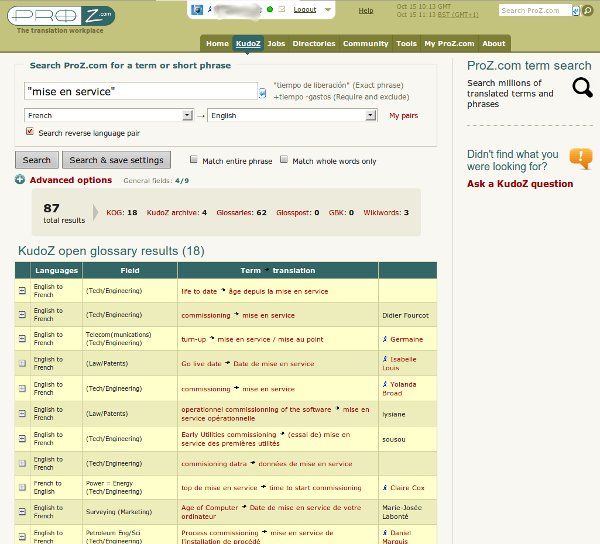
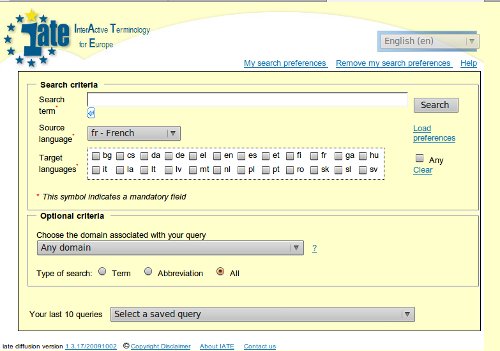
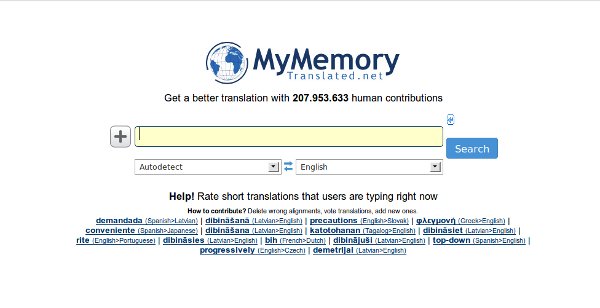

Social